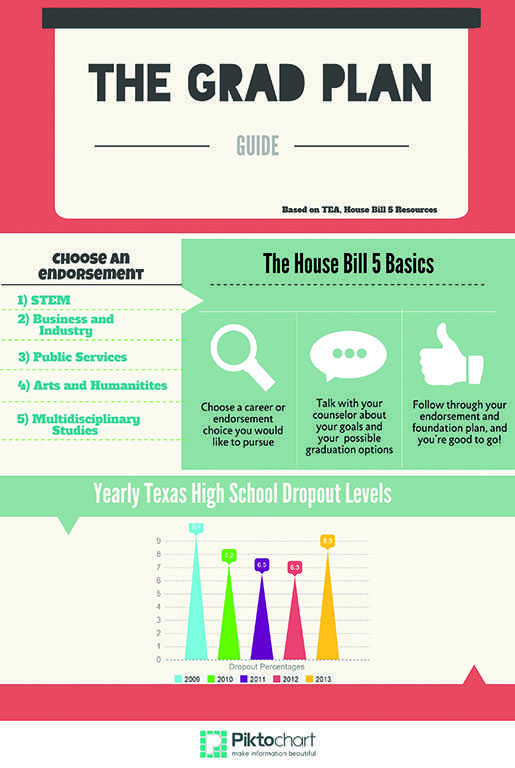HB5 Bill creates grand graduation plans
Click to enlarge
October 15, 2014
What would you like to be when you grow up?
It’s a simple question. Unassuming. A conversation starter for young adults.
However, many high school students find themselves stumped. Some haven’t even thought about their possible career choices, while others have already planned out their whole lives. But with the recent introduction of House Bill 5, the incoming freshman can not wait to choose what they want to be. They must determine their field of study early: their high school graduation depends on it.
Earlier this year in May, the Texas Legislature passed an endorsement plan that went into effect starting with the class of 2018. The plan requires students to choose a foundation plan with one of the possible five endorsements, or special areas of concentration, and implements certain courses directing them towards their general career.
“We used to have two graduation plans: a recommended and a distinguished,” District Counseling Specialist Lisa McRae said. “They were pretty spelled out. You had to have four of everything, four of English, four of math. Now we have a variety of ways to get there. It gives flexibility to the students.”
The new law gives students access to a variety of pathways in order to achieve the graduation requirements along with providing a wide selection of courses for the students to choose from.
“It gives them a lot more flexibility on what they want to study. Kind of like when you go to college, you have a major with an area of concentration,” McRae said. “These are broad categories, so within these broad categories, many careers could fall.”
Along with the variety of options, the endorsement plan even provides insight for students who don’t wish to pursue a college education.
“It’s beautiful in this way too because it can help them to be on a track straight towards a career,” McRae said. “That’s part of the broadness of it. [The plan] can put you into five major categories but within those categories are many many subcategories that you could take to get you ready for work after high school.”
The bill also has the potential to decrease the amount of high school dropouts throughout the state.
“I think [the high school dropout scenario] is certainly part of the reason why [the legislature] was so meticulous in making this plan, to help bring a wider variety of choices,” McRae said. “The whole idea is to get kids a little bit more interested in a particular area.”
However, according to freshman counselor Laury Good, the bill may hinder the potential of some students despite its many positive effects.
“Not all high schools are going to be able to offer all the possible classes for every course,” Good said. “For example, a student wants to do ROTC [Reserve Officers’ Training Corps]. We don’t offer ROTC. That sort of limits that student as far as that goes. So course selection, depending on the number of classes being offered, may be a limitation to a school.”
Some students believe that the bill has the potential to help them succeed, like freshman James Ku.
“It’ll prepare me for my future career,” Ku said. “I think it’s good for you because it sets you on your course for life.”
But others, like Jessica Li, believe that the bill will not be beneficial for the student body as a whole.
“I feel like it forces you to chose a career path early on when you’ve just entered high school,” Li said. “You have four years to decide a major [for college], and you’re not exactly forced to decide the moment you leave high school. I just don’t see the point in having an endorsement plan. My main goal in high school is to experience as many things as I can.”
The House Bill is a huge change for high school education all throughout the state of Texas, but only time will tell of its impact.
“It’s a brand new plan, starting with the current 9th graders,” McRae said. “It’s a big change for Texas, certainly a big change for our students, so we’re looking forward to working with the kids and helping them understand the plan. And we look forward to implementing it across the state of Texas.”


